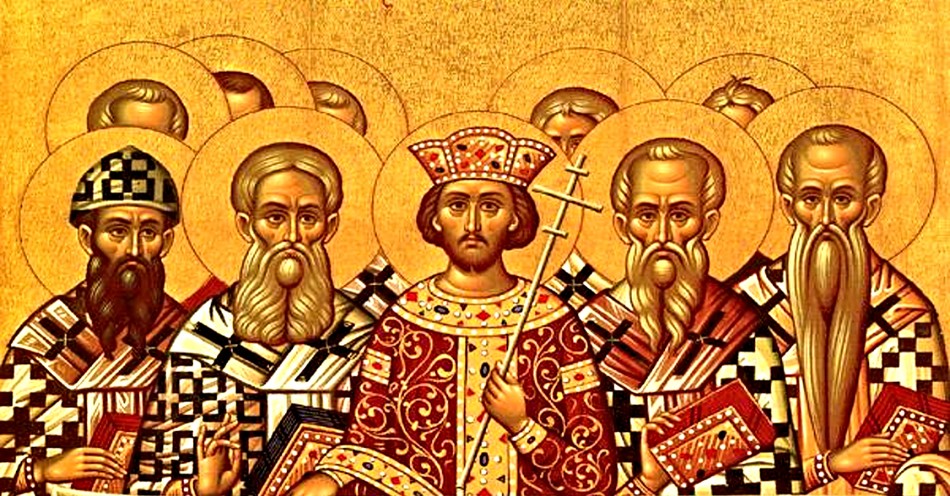Constantine was the first Christian emperor of Rome. During his 306-337 AD reign, Constantine brought sweeping religious and spiritual changes to the Roman Empire. Christians had been persecuted from Jesus’ time until Constantine’s rule. After Constantine, Christianity became the Roman Empire’s official religion… and Christians went from being persecuted to being persecutors in several ways.
Roman government changes instituted by Constantine included closing pagan temples and removing pagan deities from Roman coins. He required that all Roman subjects become Christians. Sunday became a day of rest. Confiscated Christian property was restored to its owners. His government built impressive churches and made Constantinople (Istanbul today) the imperial capital. A welfare program run by Christian clergy alleviated poor citizens’ misery.
The changes Constantine initiated represent important Christian values; however, some scholars believe he intended his religious actions to help him gain authority among all of his subjects. Christian principles fit best with Constantine’s view of the imperial cult, which supported the idea that a ruler was divinely chosen and the leader of the government’s church.
10 Important Events in the Life of Constantine the Great
1. Constantine the Great lived from February 27, 274 AD, to May 22, 337 AD.
2. Constantine’s father was Constantius Chlorus, a Roman emperor of the western region. Galerius, emperor of the eastern region of the Roman empire, warned Constantius Chlorus that he would kill his son Constantine if Constantius Chlorus tried to become the Roman Empire’s single ruler.
3. Galerius held Constantine hostage as a “captive guest” for ten years in the eastern court to control his father’s political ambitions.
4. When his father died, Constantine escaped from Galerius’ hold and sought to become the sole emperor of Rome. He battled Galerius and five other contenders for the throne.
5. Constantine’s biographer and friend Eusebius, Bishop of Caesarea, wrote in his Ecclesiastical History that “Constantine called on God with earnest prayer and supplications that He would reveal to him who He was and stretch forth His right hand to help him in his present difficulties. And while he was thus praying with fervent entreaty, a most marvelous sign appeared to him from heaven… he saw with his own eyes the trophy of a cross of light in the heavens, above the sun, and bearing the inscription, ‘Conquer by this.’”
6. Constantine’s soldiers painted “Conquer by this” and a Christian monogram on their shields. This emblem, “the Labarum of Constantine,” has appeared on coins, banners, and shields since Constantine’s reign.
7. After successfully battling rivals for 18 years, Constantine became the Roman Empire’s sole ruler.
8. Constantine’s forces, directed by his mother Helen, built the Chapel of the Holy Sepulcher in 325 A.D. This structure encloses a tomb believed to be Jesus’ pre-resurrection burial site.
9. Constantine had his eldest son Crispus executed for supposedly plotting against him. Constantine later discovered his second wife, Fausta, falsified the information about his son, and he had her put to death.
10. Constantine was baptized on his deathbed a few days before dying.
10 Quotes by Constantine the Great
1. “When religion is despised, great dangers are brought upon public affairs; but when legally adopted and observed, it affords the most signal prosperity to the Roman name, and remarkable felicity to all the affairs of men.”
2. “If any Jew has purchased and circumcised a Christian slave or one of any other sect than his own, he shall not keep the circumcised slave in servitude, but the man who has suffered this outrage shall be granted the rights of liberty.”
3. “. . . the reverence paid to the Divinity merited our first and chief attention, and that it was proper that the Christians and all others should have liberty to follow that mode of religion which to each of them appeared best; so that God, who is seated in heaven, might be benign and propitious to us, and to every one under our government.”
4. “O holy faith, who givest us in our Saviour’s words and precepts a model, as it were, of what our life should be…”
5. “In my own judgment, he whose first object is the maintenance of peace, seems to be superior to Victory herself.”
6. “His only demand from man is purity of mind and an undefiled spirit; and by this standard he weighs the actions of virtue and godliness. For his pleasure is in works of moderation and gentleness: he loves the meek, and hates the turbulent spirit: delighting in faith, he chastises unbelief: by him all presumptuous power is broken down, and he avenges the insolence of the proud.”
7. “While the arrogant and haughty are utterly overthrown, he requires the humble and forgiving with deserved rewards: even so does he highly honor and strengthen with his special help a kingdom justly governed and maintains a prudent king in the tranquility of peace.”
8. “This is certainly the Will of the Supreme God, . . . that the whole human race should agree together and be joined in a certain affectionate union by, as it were, a mutual embrace.”
9. “In my own judgment, he whose first object is the maintenance of peace, seems to be superior to Victory herself.”
10. “With Free minds all are to worship their Gods.”
10 Things You Should Know about Constantine the Great
1. Constantine’s father believed in one God, who protected people better than multiple pagan gods.
2. Only 10 percent of Roman citizens were Christians when Constantine assumed power.
3. The dominance of Christendom—a political world in which pagan temples closed and all Roman subjects were required to become Christians—did not take shape until 380 AD, forty-three years after Constantine’s rule ended.
4. Dorothy L. Sayers’ play Constantine depicts his guilt over executing his eldest son, due to Fausta’s desire for her son to become emperor.
5. Constantine’s mother, Helen, was an enthusiastic Christian who oversaw the construction of historic Christian churches in Bethlehem and Jerusalem. Most importantly, she oversaw the construction of the Church of the Holy Sepulcher, where Christ was reportedly buried.
6. Constantine traveled 1600 miles on horseback to escape his 10-year captivity arranged by his father’s rival, Emperor Galerius.
7. One of Constantine’s early acts as sole emperor was to draft a proclamation that ended the official persecution of Christians. Called the Edict of Milan, it placed Christianity on a par with the other faiths and let Christians practice their religion in the Roman Empire.
8. He presided over the crucial council at Nicea in 325 AD, which formally declared Jesus Christ’s divinity.
9. Constantine arbitrated church disputes as Pontifex Maximus, the highest priest of the Roman Empire.
10. The Eastern Orthodox Church reveres him as a special saint, an isapostolos (a saint recognized for outstanding service in spreading Christianity). Other saints on the isapostolos list are Mary Magdalene and Christ’s disciples.
What Was Constantine's Legacy?
Constantine’s influence in spreading Christianity helped establish the early church. It became fashionable to be a Christian in Roman society, and the church spread more rapidly than in the past. His violent acts, on the other hand—warring with political rivals and executing family members who threatened his power—did not further Christian values. The Christian church, which had been passive before Constantine’s reign, now ruled the Roman Empire with bloody battles and political intrigue. Some theologians believe Constantine drew the Christian church away from Biblical practices and simple faith with Christianity’s newfound popularity. Because Constantine was human, there were positive and negative aspects to his life and career as a great leader of the Roman Empire and the early Christian church.
Quotation Sources
The first quotation is from a Christianity.com article, “Who was Constantine: Christian or Opportunist?” Quotations two through nine are from Quotepark.com. Quotation 10 is from AZQuotes.com.
Photo Credit: Wikipedia/Public Domain

This article is part of our People of Christianity catalog that features the stories, meaning, and significance of well-known people from the Bible and history. Here are some of the most popular articles for knowing important figures in Christianity:
How Did the Apostle Paul Die?
Who are the Nicolaitans in Revelation?
Who Was Deborah in the Bible?
Who Was Moses in the Bible?
King Solomon's Story in the Bible
Who Was Lot's Wife in the Bible?
Who Was Jezebel in the Bible?
Who Was the Prodigal Son?








